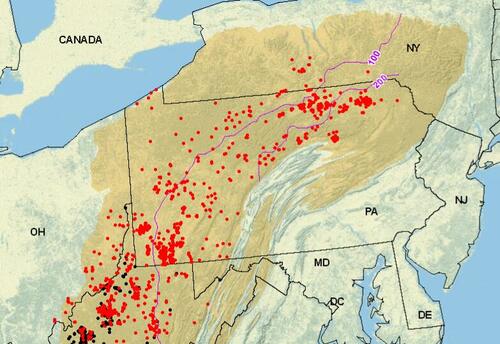Authored by Athan Koutsiouroumbas via RealClearPennsylvania,
Pennsylvania was supposed to be the energy state that got it right.
Thanks to the Marcellus Shale formation, natural gas made Pennsylvania a net exporter of electricity. Fracking enabled Pennsylvania to power homes and industry not just here, but across the entire Mid-Atlantic. The state’s natural gas built modern power plants, attracted investment, and helped America move toward energy independence.
So how is it that Pennsylvanians are still paying more for electricity every year?
Over the past five years, electricity prices in Pennsylvania have risen 45%. It is a tick lower than the national average of a 46% price increase. However, that is hardly comforting when neighbors across the border, in states that import electricity from Pennsylvania, have seen smaller increases.
Let that sink in.
Four of the six states surrounding Pennsylvania buy electricity from us. Yet, somehow, their electric prices have risen less than ours. For a state that exports power, it is puzzling and unacceptable.
It gets worse.
The state of Virginia relies on importing electricity from Pennsylvania. It is also home to more data centers than any other state. Yet, Virginia only saw its electricity rates increase at half as much as Pennsylvania’s despite being home to the energy-hungry industry.
Pennsylvania sits at the center of the massive regional grid that keeps the lights on in thirteen states and Washington, D.C. The Keystone State produces more power than it uses. Incredulously, Pennsylvanians are stuck watching their electric bills rise. It is like owning a bakery and still paying more for bread.
The irony is that Pennsylvania has every advantage: abundant natural gas, modern generating capacity, and a location that makes it a key hub in the national energy market. What is missing is the advantage that should matter most: affordability.
Prices are not rising because Pennsylvania has run out of energy. Quite the contrary. Pennsylvania has decades, potentially centuries, worth of natural gas. It does not cost more to generate electricity. When adjusted for inflation, the cost to make an electron has declined 11% while the cost to send electrons to customers has increased 14%. That’s a wallet-busting 25 point spread.
Prices are rising because regulation, transmission costs, and capacity auctions for potentially inflated demand are stacking fees on top of fuel. Somewhere between the wellhead and the wall outlet, efficiency has turned into bureaucracy.
Voters are noticing: 86% of likely voters are concerned about their electric bill. For example, a nearly a majority of digital ads are focused on defining who is to blame for New Jersey’s escalating electric prices in a heated, competitive race for governor. Just as many likely run on television.
Pennsylvania’s leaders would be wise to pay attention. Gov. Josh Shapiro, the entire state House, and half of the state Senate are up for re-election in 2026. Energy is already shaping up to be the pocketbook issue that connects inflation, regulation, and frustration all at once.
No talking point can fix the reality that families know they live in a state that exports power yet still see prices rising faster than their paychecks.
Steps are being taken to address the key issues.
A bill was introduced this week to stop the double, and even triple, counting of the same pending data center projects which may be artificially inflating electricity prices.
Projects ready to deliver electricity into the grid have languished in the operator’s bureaucracy for reasons unknown. Policymakers have applied pressure to compel the grid operator to approve proposed projects more quickly without sacrificing safety.
Both parties agree that siting reform is necessary to bring more electric generation projects online. Gov. Shapiro’s proposal to create a new authority usurping local decision-making has met considerable pushback. Meanwhile, state Senate Republicans have advocated for a proposal that addresses NIMBY issues while expediting large-scale electric generation projects.
Electricity is not just an economic metric. It’s indicative of competence.
People expect government to deliver basic things: safe roads, good schools, and affordable power. When those expectations are not met, trust continues to erode.
If our neighbors can buy our electricity more cheaply than Pennsylvanians can, something is wrong in Harrisburg. The fix is not complicated. Pennsylvania does not need more bureaucracy, more fees, or more rhetoric about “transition.”
If we can power half the East Coast, surely we can power Pennsylvania affordably.
Loading recommendations...
